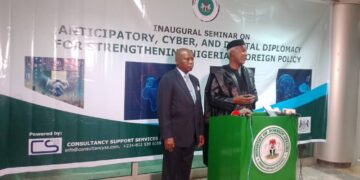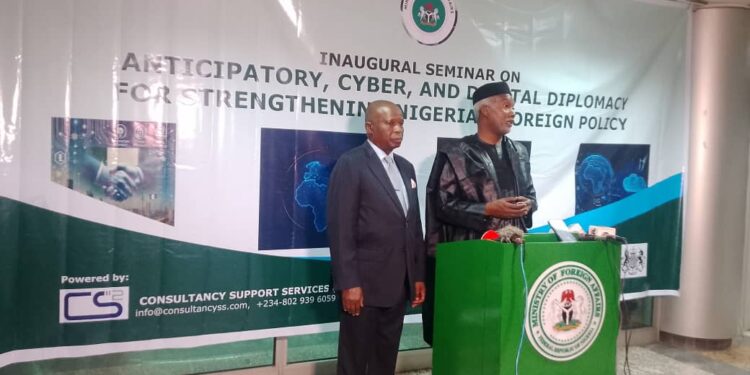By Ebi Kesiena
The Nigerian government through the Ministry of Foreign Affairs has unveiled the Cyber Diplomacy initiative designed to strengthen Nigeria’s foreign policy architecture and equally equip diplomats with the necessary tools to confront the challenges of the emerging digital age.
As, this will enable Nigeria and its diplomats to align with the evolving realities of the digital age.
Delivering a keynote address at the Seminar on Anticipatory, Cyber, and Digital Diplomacy in Abuja on Tuesday, the Foreign Affairs Minister Yusuf Tuggar noted that Nigeria must act decisively to become a forward-looking player in the global digital order.
He explained that anticipatory diplomacy would help the country detect early warning signals, foresee systemic shocks, and shape outcomes in areas such as artificial intelligence, critical minerals, and global supply chains.
Tuggar decried the harmful consequences of unregulated technology in Nigeria, citing how cryptocurrencies created safe havens for kidnappers, violent extremists, while hate speech and disinformation disrupted governance and trust. “These are not abstract issues. They have real-world consequences: lives lost, futures ruined, and public trust undermined,” he said.
In the spirit of this forward-looking vision, he announced the establishment of a dedicated Cyber Diplomacy Unit within the Ministry of Foreign Affairs. According to him, the Unit will coordinate Nigeria’s cyber-related foreign policy, strengthen capacity for international cyber negotiations, foster public-private partnerships, and ensure the country’s voice is influential in global cyberspace governance.
The Minister further explained that Nigeria must train a new generation of cyber negotiators, expand regional incident response capabilities, and champion African-led digital solutions.
Also, he emphasized that women, youth, and the Nigerian diaspora must be central to this agenda, while he called on the private sector including banks, fintechs, and telecom companies, must serve as frontline partners in protecting digital interests.
Furthermore, he unveiled a new Masterclass Series on Anticipatory, Cyber, and Digital Diplomacy, describing it as “Nigeria’s digital gift to the world,” aimed at building globally competitive diplomats across Africa and the Global South.
Meanwhile in his goodwill message at the seminar, the Attorney General of the Federation and Minister of Justice, Lateef Fagbemi (SAN), said the 21st century had introduced a paradigm shift in conflict, communication, and cooperation, demanding a transformation of traditional statecraft.
“You will agree with me that the 21st century has introduced a paradigm shift in the nature of conflict, communication, and cooperation, demanding a fundamental transformation of traditional statecraft,” he said.
The Attorney General stressed the role of law in strengthening cyber diplomacy. “Cyber threats pose a danger to national infrastructure and the rule of law. Our legal framework must therefore be robust enough to deter cybercrimes, enforce justice, and foster international cooperation to protect digital sovereignty,” he said.
He maintained that the Ministry of Justice was “committed to collaborating with security agencies, foreign affairs officials, the private sector, and civil society to build a comprehensive and effective strategy”.
In a keynote address, Prof. Nnenna Ifeanyi-Ajufo, Professor of Law and Technology, Leeds Law School, Leeds Becket University, applauded the initiatives on positioning Nigeria for the future, harnessing anticipatory cyber and digital diplomacy for global influence and national resilience.
Prof Ifeanyi-Ajufo noted that Nigeria as Africa’s largest economy and one of its fastest growing digital hubs, must be deliberate in the choices we make today as a Nation in anticipatory cyber and digital diplomacy adding that this will determine the strength of its global influence and the resilience of the nation in the year ahead.



































